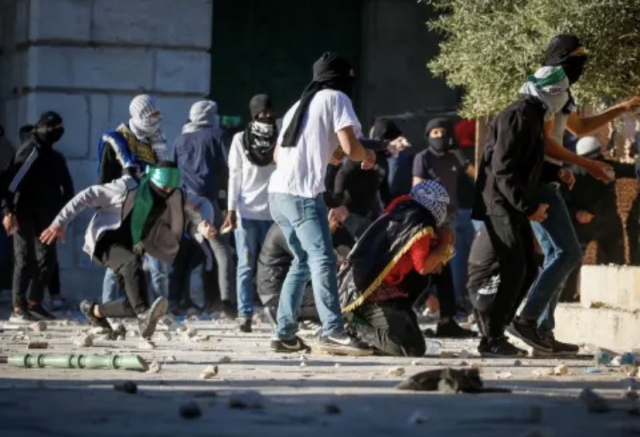Every year ahead of Passover, a few lone-wolf radical Israelis embark on a mission to secretly bring a lamb to the Temple Mount, to conduct the ancient Passover sacrifice that was traditionally offered to God by the high priests, or Kohanim, of the first and second Temple; and every single year the small groups are stopped and arrested by Israeli authorities who are committed to maintaining the peace and status quo on Temple Mount, known in the Muslim world as the Al-Aqsa mosque compound.
This year was no different, except that many Arab media outlets and Palestinian terrorist organizations made it a point to report on the ‘Zionist desecration of Al-Aqsa’, causing a stir amongst East Jerusalem Arabs that led to riots in the compound after a group of Muslims fortified themselves within the mosque and confronted Israeli police officers with stones and firecrackers in their hands. Naturally, Hamas leadership in Gaza seized the opportunity to fire a bunch of rockets toward Israeli towns, resulting in an Israel Defense Forces airstrike response within the strip. As the developing story unravels, a major question comes to mind; why do Palestinian nationalists constantly pick such a holy site to Islam, like Al-Aqsa, as a fighting ground against the Zionist enemy?
TEMPLE MOUNT RAMADAN TERRORISM
— Australian Jewish Association (@AustralianJA) April 5, 2023
Dramatic video just in from Israel.
Temple Mount during Ramadan. Desecration of a so-called holy Muslim site, the al-Aqsa mosque — carried out by Muslims — to provoke further violence for media & PR.
Stock piles of terror supplies. What a disgrace. pic.twitter.com/fCh64aO1mo
In recent decades the Al-Aqsa mosque in Jerusalem has been embellished in the Islamic world as a site with great holiness and value; a mosque that symbolizes the Palestinian and Muslim claim to Jerusalem and the entire land of modern-day Israel. Despite no previous large historical importance to the site, and even looking past the very clear political tactic behind redefining the standard mosque into a pillar of the religion; like any other religion, Muslims have the right to make reforms in their religious values in any way they see fit and anyone who argues with that is going down an endless rabbit hole.
The repeated desecration of Al-Aqsa Mosque by Hamas Muslim Brotherhood #extremists is unacceptable. Imagine if this happened in Mecca, the outrage would be universal. Let's unite for the protection of religious freedom & cultural heritage. 🕌🕊️ #AlAqsa #Jerusalem #Peace @AviKaner pic.twitter.com/qBuqKwh7Ld
— Eliana David (@IamMikaDavid) April 5, 2023
What is troublesome about the new holiness given to the Temple Mount in the Islamic world, is just how poorly they treat the place, which stands directly over the ancient ruins of Solomon’s Temple as well as a Byzantine era church built by the Emporer Justinian on the southwestern corner of the compound. How could a place of such divinity be used as a barracks for storing firecrackers and stones used strictly for violence? If Allah is indeed the same God of the Hebrews, there is not one quote or interpretation of the Bible that would even remotely support such acts within such a holy and ancient place of resting for the maker of this world. This goes without mentioning that even when the compound does not become a scene of a riot, it is heavily documented it is also used as a playground for kids kicking around a soccer ball.
Palestinian rioters desecrate Al-Aqsa Mosque by exploding fireworks, throwing stones, and breaking things.
— Chaya חיה 🇮🇱🌻 (@chayarivka) April 5, 2023
But for them that's not the problem - it's the mere presence of Jews trying to restore calm and protecting a Muslim holy site that constitutes 'desecration'. https://t.co/SAdiO9aiER
If a riot broke out at the Western Wall that was even slightly as violent as a Palestinian riot on the Temple Mount, the leading rabbis of Israel would likely declare a day of fasting, mourning, and reflection amid the desecration caused at such a holy place; and the only reason the Western Wall is so holy is that it is the closest most Jews can be to the ruins of the Temple itself. The latter was mentioned not to, God forbid, claim that Judaism takes holiness any more seriously than Islam, but as a call to the Islamic world to reevaluate the loose religious rules given for Al-Aqsa, rules that are not existent in any other holy Muslim site.
You cannot have it both ways; either define a place as holy and treat it as such, or reinstate its historical stance as just another ordinary, gorgeous mosque and do as you see fit with the compound. But perhaps the worst thing to do, for the sake of the three leading monotheistic religions, is to declare such holiness to a site and use the massive influence of media outlets to convince the entire globe, only to taint the air of that site with the unpleasant smell of gunpowder. The current behavior of Palestinian nationalists at Al-Aqsa quite frankly gives a bad name for all Islam and makes all those observing wonder if ‘holy’ has a different meaning in Arabic.


